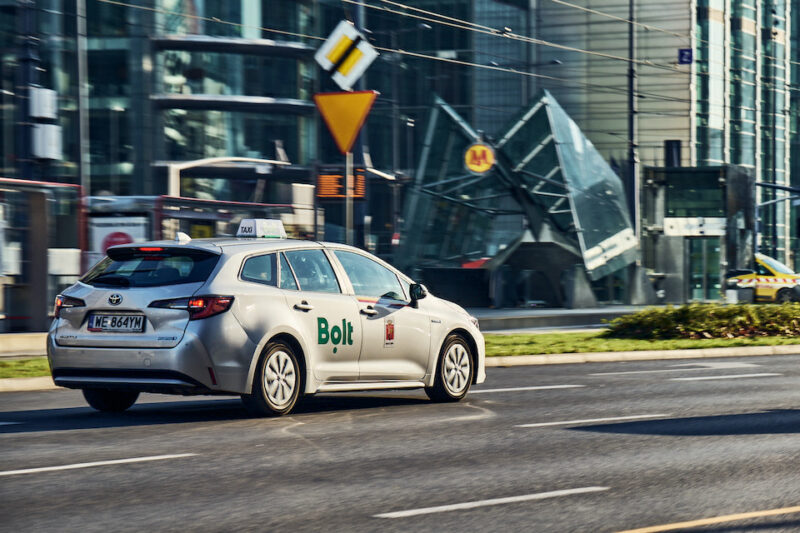Leading ridesharing firms in Poland have reported a significant decline in their number of drivers following the introduction of new rules this week that require drivers to hold a Polish driving licence and to have resided in Poland for at least 185 days.
One provider, FreeNow, says it has lost 15% of its drivers. Another, Bolt, reports that it now has 26% fewer drivers in the capital, Warsaw.
However, Uber believes it has found a loophole in the law that allows it to take up to three months to verify the documents of existing drivers, who can continue working in the meantime. That has prompted criticism from its competitors and doubts from experts.
Drivers working in Poland through ridesharing services such as Uber and Bolt must now possess a Polish driver's licence under new regulations that went into force today.
For more, see our report from earlier this year:https://t.co/WjvZNulhiB
— Notes from Poland 🇵🇱 (@notesfrompoland) June 17, 2024
The new restrictions on ridesharing drivers were approved last year under Poland’s previous government and went into force this week, on Monday 17 June. They require that such drivers have a Polish licence and only allow foreigners to apply for a licence once they have resided in Poland for 185 days.
Within days of the measures going into force, ridesharing firms claimed they were seeing a big decline in their number of available drivers.
“Today, 26% fewer drivers are driving with the Bolt app in Warsaw,” the firm’s country manager for Poland, Paweł Kuncicki, told financial news website Money.pl. He said that most of those who had departed are Ukrainians, who make up Poland’s largest immigrant group.
Another ridesharing firm, FreeNow, said that it had to block 15% of its drivers due to the legislation. However, its managing director in Poland, Krzysztof Urban, said that some of them were waiting to receive a Polish licence and would therefore be able to return in the future.
🔴TYLKO U NAS. Z dnia na dzień kilka tysięcy kierowców taksówek w całym kraju zostało odciętych od zawodu. Chodzi o świadczących usługi przez aplikację przez obcokrajowców@boltapp @FreeNow_PL #taksówki @Uber
Kliknij w zdjęcie, aby przeczytać więcej🔽https://t.co/KZVcSy99DN
— Rzeczpospolita Biznes (@RPEkonomia) June 18, 2024
Meanwhile, a spokeswoman for FreeNow, Martyna Kurkowska, told the Rzeczpospolita daily that “unfortunately it appears that not all players in the market have complied with the current legislation”.
That appears to be a reference to Uber, Poland’s largest ridesharing service, which is using an apparent loophole in the law.
It says that it has banned new drivers from registering if they do not have a Polish licence but continues to allow the foreign drivers who have already been working for the company to operate, even without confirmation of proper documents, claiming that the firm has until 17 September to verify its employees.
“We carried out legal consultations aimed at fully understanding our obligations in this area. These measures confirmed our understanding of these provisions,” the company told Money.pl.
However, Adrian Furgalski, president of ZDG TOR, an advisory firm specialising in transport, questioned Uber’s claims. “I don’t know where the idea of September came from, because Monday 17 June…is quite clearly spelt out in the Act,” he told Money.pl.
A spokeswoman for police headquarters, Wioletta Szubska, also told the website that “from Monday, all drivers must already have a Polish driving license”. Those who do not can be fined 2,000 zloty (€462), she added.
Na @Uber kierowcy nadal jeżdżą bez polskiego prawa jazdy. Firma potwierdza i przekonuje, że to zgodne z nowymi przepisami. Innego zdania jest @PolskaPolicja – zapowiada kontrole i mandaty.
Tekst w @Money_pl / #mobility https://t.co/VTywHM5n4I
— Marcin Walków (@marcinwalkow) June 18, 2024
Uber has previously strongly criticised the new measures. Its director for Central and Eastern Europe, Marcin Moczyróg, told broadcaster TVN in April that they would “cripple the market by both significantly reducing the availability of rides and significantly increasing their cost”.
“We estimate that we are facing an exodus of 15 to 30% of drivers,” Michał Konowrocki, Uber’s managing director of passengers for Central and Eastern Europe, told Dziennik Gazeta Prawna.
On the first day of the new law being in force “we observed a 35% increase in waiting times and 20% of journeys were cancelled due to excessive waiting times. Passengers waited the longest for a ride in Katowice and Łódź”, Uber’s press office told news website Onet.
Polski rynek taxi sparaliżowany. Nowe przepisy spowodowały, że tysiące kierowców straciły pracęhttps://t.co/3RTZbnDlHt
— Wprost Biznes (@Wprostbiznes) June 19, 2024
FreeNow’s Urban, however, said that “it will take some time to assess the effects [of the new law], as they are related to the seasonality of demand and the extent to which other platforms have adapted to the new regulations”.
Meanwhile Android, a leading Polish technology website, carried out its research on costs and waiting times for Uber and Bolt in three Polish cities – Warsaw, Kraków and Łódź – before and after the new rules entered into force.
It found that for Uber, there was actually a slight decrease in waiting times and prices whereas for Bolt they mostly increased.
Nowe przepisy wymagające polskiego prawa jazdy – czy ceny Uber i Bolt wzrosły? 🚖 Sprawdziliśmy! Koszty Ubera nawet spadły, a Bolt podrożał. Jak to wpłynie na przyszłość transportu? 🌍 #Uber #Bolt #Transport #PrawoJazdy https://t.co/l3HJQAVgbI
— android.com.pl (@android_polska) June 17, 2024

Notes from Poland is run by a small editorial team and published by an independent, non-profit foundation that is funded through donations from our readers. We cannot do what we do without your support.
Main image credit: Bolt (press materials)

Agata Pyka is a former assistant editor at Notes from Poland. She specialises in Central and Eastern European affairs, cybersecurity, and investigative reporting. She holds a master’s degree in political communication from the University of Amsterdam, and her work has appeared in Euractiv, the Balkan Investigative Reporting Network (BIRN), and The European Correspondent, among others.



















